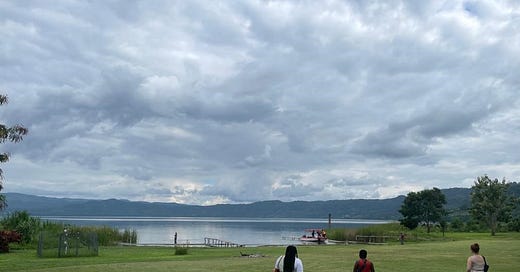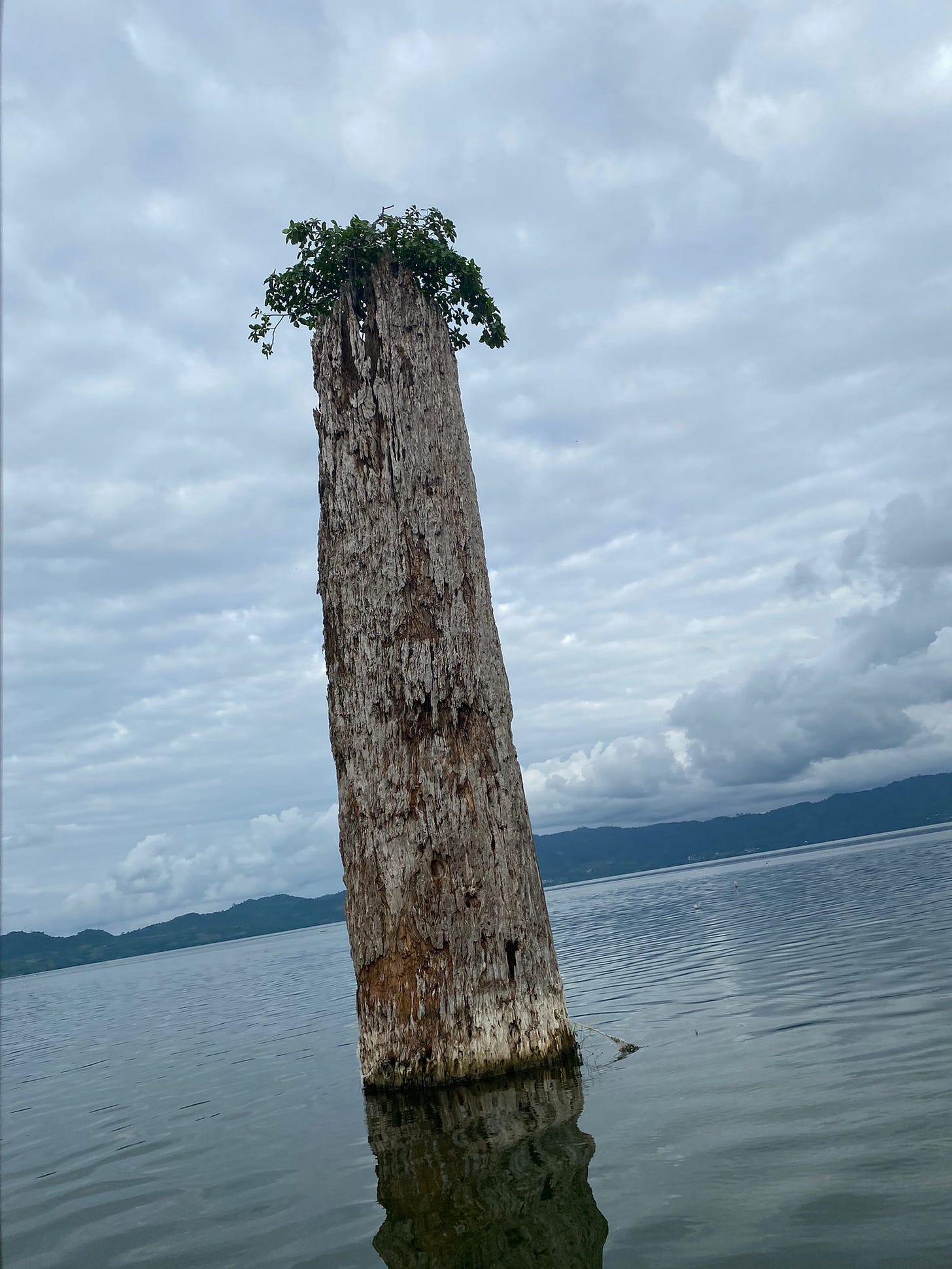The road out from the south of Kumasi towards the resort at Lake Bosomtwe hits a bottleneck at the city’s perimeter. Happily, the pause while wrestling to hit the open road gives ample opportunity to glance at the heaving street life on all corners. Here, a vendor catches you staring hopefully at the steaming bofrot with a knowing smile; there, a preacher sets about his work with such fervour that the cacophony of car horns is but a footnote to his all-mastering voice; and over yonder, two goat kids interlock horns and topple over on their young, unsteady legs.
Fortunately, one is never a passive observer of the city streets when sat in traffic with the windows down. It isn’t long before I baffle a young woman selling treats with my sparing Twi, and I am rescued from my embarrassment by my friend. With plantain chips secured, the congestion has thinned out and the Lake road sits invitingly before us. I spend a little time typing into my phone what I should have said, adding a childishly simple phonetic guide. I was keen to try and be a part of the life I had hitherto watched from the window - even if just for a few minutes.
It wasn’t too much longer before we were cruising down a steep road into what looked to be a vast bowl of land. The outskirts were distinguished by verdant mountainside, boasting a mixture of rainforest and wetland vegetation. At the centre, Lake Bosomtwe shimmered. It was bespeckled by little sedate figures wading in to catch fish or to remove an errant piece of litter. Calmness oozed from the water for miles around. I got the impression from the surrounding infrastructure, designed for leisure, that this was not always the place of restful solitude it was today. Indeed, the only company we shared for lunch was a roving band of cats, lured by the smell of freshly fried fish and ready to duke it out amongst each other for any flakes that might fall from the plate.
There are two origin stories for this, the lone natural lake in Ghana. Oral tradition relates the story of a hunter, Akora Bompe, pursuing an injured antelope that took refuge in a small pond in 1648. He was amazed. It was as if the water was guarding the antelope from him. He left his home behind him and settled by this growing pond to fish and show reverence for ‘Bosomtwe’ (roughly translating in English to ‘Antelope God’). The villages that line the shore have their own shrines and fetish groves which are still used in practice today, underlining the deep-held wonder this lake has for those who behold it.
Alternatively, it is thought that the lake formed after an ancient meteor strike, resulting in a crater covering nineteen square miles and impacting as deep as 240 feet. To get a sense of the magnitude of such an impact, it is thought that tektites (bits of terrestrial debris) which have been found in the neighbouring country, Cotê d’Ivoire, were thrown up from the floor of the lake. This would make the lake over a million years old and, thus, a place of fascinating historical and scientific discovery.
In a way, there is truth in both the science and the folklore. The lake tells a story that, though long in its span, couldn’t be more pertinent for the present moment. At the water’s edge, dead tree trunks, submerged fifteen to twenty metres underwater, jut solemnly above the surface. They indicate the history of mega-droughts in this region. These trees are thought to have grown five hundred years ago when the water level at the lake was so low that a forest sprung up around the crater. The traditional tale of Akora Bompe is not so discardable in light of this. Why would someone turn their back on home to hunt an antelope; why would they rejoice and find themselves praising deities if they found a small, self-sustaining pond? In the context of a vast drought where fishing and farming opportunities are scarce, one can begin to answer these questions.
Of course, I’m at risk of reading this too literally, but I have two points to end on. There is a popular piece of wisdom that comes from the Akan people of Ghana: Sankofa. It means ‘go back and get it’ and is sometimes symbolised by a mythical bird flying forwards with its head turned backwards. The wisdom being that we should not be too proud to retrace our steps and save things that we have left behind. In this case, the oral history of the lake might not be scientific, but it holds a prescient meaning. Given the growing irreversible changes we are making to the climate, Bompe’s story reminds us of the immeasurable value of this lake as a source of water, food, leisure, and peace for the people it serves. The folkloric wonder at the presence of this lake ought not to be the stuff of myth, but an example of the need to protect such resources, as they have protected us.
In addition to retrieving from oral culture, Sankofa can be thought about in terms of the climate crisis (with apologies to those who feel I am overreaching - I am not a scientist). It seems to me that shame and, consequently, taboo prevent us from coming to terms with the projected natural disasters before us, at least at the political level. The narrative that retracing our steps is a humiliating admission of the mistake we have made is harmful. Is it really weak to look back at what we have done and learn what we can to improve our future actions, or is that really the first step towards becoming as strong as we want to be? It is not as easy as changing our mindsets and the problem will magically be solved, this I know, but how much will those who are most vulnerable to rising sea levels and changing weather patterns have to suffer before a powerful minority realise how trifling their pride is by comparison?
On a cheerful note, when we slowed to look at one of these tree stumps, I was warmed to see the new life that had grown out of it. Like a kind of Russian doll, a small tree was genially growing out of the old tree. It made me smile to think of life’s furious impulse to live. To live even where it died before. Wow.





